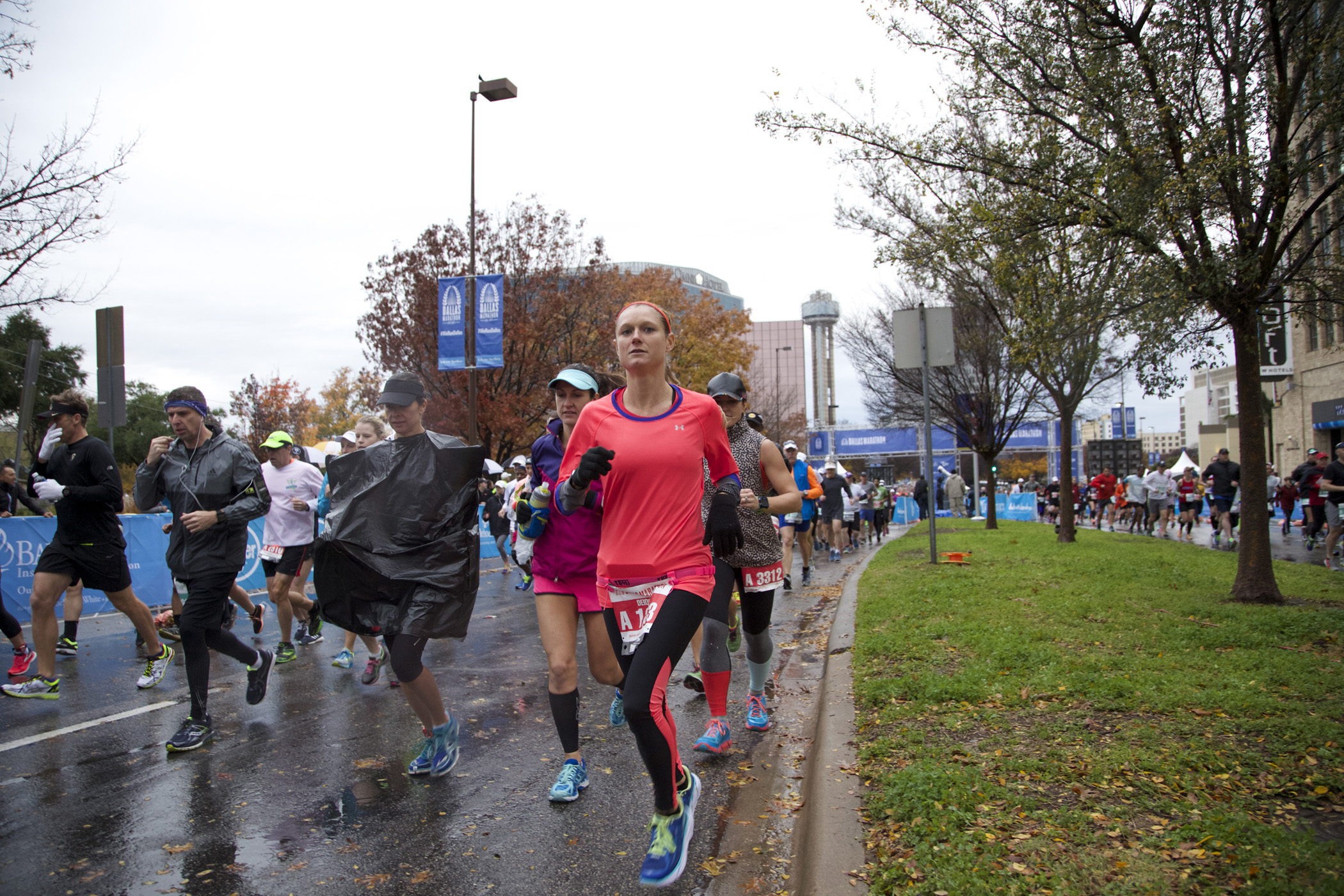Whether you’re a marathon maven or prepping for your very first race, D Magazine is here to help. With the Dallas Marathon just a few short weeks away, we enlisted the help of area experts to help you fly through those 26.2 miles with ease.
Many runners new to the racing world have several myths to sift through when it comes to crafting their perfect training plan. Jeremy Allen, a certified fitness instructor at the Baylor Tom Landry Fitness Center, and Dr. Logan Sherman, 2015 Dallas Marathon winner and chiropractor, shed some light on some common running myths.
Should You Stretch Before a Long Run?
Allen suggests easing into a pre-run stretch to prevent injury. Stretch a bit more aggressively after you run. While warming up prior to your run, dynamic stretches are most beneficial.
Sherman recommends walking or lightly jogging a few minutes to get your blood flowing before you run. “I have also experimented with taking a warm shower before a hard workout or a race and found that it helps the muscles warm up faster and allows me to feel more relaxed throughout,” Sherman says.
A Heaping Bowl of Pasta the Night Before Race Day is Good, Right?
Consuming carbs is important, but maybe you shouldn’t reach for a bag of pasta, Allen says. “Pasta is a source of carbs, but you want to begin carb loading two or three days before your race,” Allen says. “Also, pasta isn’t the ideal source of carbs to eat the day of your race because it might not agree with your stomach, and it also might be too heavy. Try some lighter carb options such as bread, a banana, oatmeal, and yogurt.”
Sherman added that it’s important to include a balanced mix of protein. “Protein will help you feel full, but it will also be beneficial in helping the muscles with last-minute repairs,” Sherman says. “I generally stay away from big pre-race pasta meals, but I know many runners who make it their go-to pre-race cuisine.”
Bottom line: don’t introduce something brand new to your diet the day before your marathon, and do a trial run the evening before a long training run.
Sports Drinks or Water?
Depending on the environmental conditions, it can be helpful to drink a sports drink, but only if you are certain your stomach can handle it. Just like with the pre-race meal, it’s important to test out these variables during training.
You can usually find out what types of beverages they will offer at each stop before a race, which is helpful when planning ahead.
“If you find out that your race-day temperature and humidity is high, ingesting a salt or electrolyte pill or drinking a sports drink is strongly advised,” Sherman says. “Our bodies need a proper balance of water and electrolytes to stay hydrated. Too much water will dilute the electrolytes and ultimately affect performance, and too little water can cause excessive dehydration.”
Even a 2 percent loss in body weight can have a negative impact on a runner’s performance. Bottom line: if you are thirsty, you are already dehydrated.
Is Running Barefoot Better For You Than Running Shoes?
We’ve all seen the Vibram five-finger shoe, which simulates running barefoot. The prominence of these shoes jumpstarted the belief that we should be able to run in as minimalistic shoe as possible. Sherman says this idea was good in theory … but only in theory. Stress fractures are more likely to occur, as there isn’t a strong base of support.
“Throughout all my years of running and treating athletes, I have learned that a running shoe might be great for one patient, but could be very detrimental to another,” Sherman says. “I encourage runners to consult with a specialist about their specific needs.”
Should I Run Every Day When Training?
Not necessarily. And if you miss a scheduled training run in your weekly routine, it’s not catastrophic.
You want to cycle properly so you can build up your muscle and lung capacity without injuring yourself, Allen says. Slowly decrease your mileage a few days leading up to a race so that you’re adequately rested.
Sherman says when he’s training, he typically runs every day leading up to a race because it helps keep the blood flowing and the legs fresh. He’ll do short bursts or running at “marathon pace” during a few of his runs as well.
“I’ve noticed that runners often slow down too much during their taper phase at which point the legs begin to adapt to a slower running pace compared to what they have been training,” Sherman says. “If you feel more comfortable taking one or two days off before running a marathon, do not forget your foam rolling exercises.”





